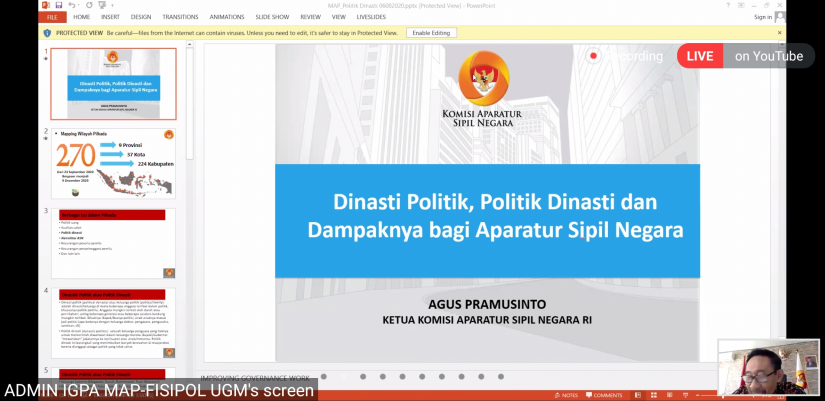
Yogyakarta, August 6th 2020—Institute of Governance and Public Affairs of Magister of Public Administration, Fisipol UGM held a webinar called ‘Regional Autonomy and the Rising of Dynastic Politics in Indonesia’ on Zoom Meeting. Apart from discussing dynastic politics and its relation with regional autonomy, which had been widely discussed by people, this webinar also held a book launching with the title Koki Otonomi that written by one of the speaker, Prof. Djohermansyah Djohan, MA—the Professor of Institute Government Of Home Affairs (Institut Pemerintahan Dalam Negeri/IPDN).
Other than that, this webinar was also attended by the other three speakers, Prof. Dr. Agus Pramusinto, MDA—the Head of KASN and professor of MPA Fisipol, Dr. J. Kristiandi—the Senior Researcher of CSIS Jakarta, and Dr. Siti Nur Azizah Ma’ruf—South Tangerang Mayor Candidates. The Dean of Fisipol UGM, Dr. Agus Erwan Purwanto, M.Si., also presented to give an opening speech and open this webinar.
The rising of dynastic politics could be caused by several factors, Prof. Djo explained. These factors certainly arose from positive considerations, such as relatives were more trustworthy, loyal, and it was impossible for them to be a traitor, also they have strong solidarity will to help their families. But, in practice, there were several negative things that happened because of dynastic politics in this regional autonomy era. From the piracy of democracy by the groups of elites, the head of region that was not competent, to the regional governance tended to be bad. Unfortunately, the institutional weaknesses of political parties and absence of rule of game caused dynastic politics to develop more and reached a big number. Prof. Djo explained this topic according to his experience and he saw directly from the field. As the closing statement of his explanation, Prof. Djo also explained about several efforts that could be done to prevent negative practices in dynastic politics.
According to the next explanation by Prof. Agus, it turned out that dynastic politics gave impacts for the civil servants. But, before talking about the impacts, Prof. Agus explained the differences between two terms: political dynasty and dynastic politics—that had different definitions, and also positive and negative sides of those things.
For the civil servants itself, the rising of dynastic politics tended to give negative impacts, because there were possibilities to use state facilities in the campaign. Other than that, Prof. Agus also said that there would be mobilization of civil servants in the process of support which could lead to the violations of civil servants neutrality. Furthermore, after the regional election, there could be politics of reciprocation and revenge. This could disturb the merit system in the recruitment of civil servants. Because rather than considering competence, qualifications, and performance, the existence of dynastic politics will be based more on political affiliation and kinship as a consideration. As the illustration of the explanation, Prof. Agus explained the data which related to dynastic politics cases, and he closed his session with the efforts that must be made.
Siti, the next speaker, also agreed with the explanations from the last two speakers, especially Prof. Djo that in his explanation talked about the results of book review Koki Otonomi—a book that Prof. Djo wrote, she agreed with many points that Prof. Djo wrote in that book. Not only that, the moderator—Prayoga Permana, Ph.D— also gave a chance for Siti to talk about her experiences and motivations until she finally running as a candidate for Mayor of South Tangerang.
What had been said by the three speakers then emphasized by the last speaker, Kris. He responded to Siti’s story, that a person should not lose her/his political rights because he has kinship with public officials. Because of that, the most important thing is the existence of transparency, even from the recruitment stage. The public should also be given the opportunity to judge. Not only that, strong institutions, managerial competency, and moral competency also became an important thing that must always be considered, Kris emphasized.
After all of the speakers explained their topics and after the question and answer session, then moderator gave a chance for Prof. Djo to talk about his book that he wrote. After that, Koki Otonomi officially launched. For those who could not join this webinar, could watch the rerun on the MAP FISIPOL UGM YouTube channel.
